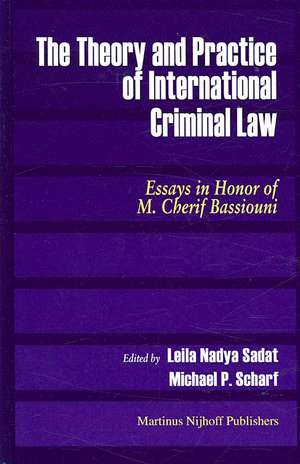The Theory and Practice of International Criminal Law: Essays in Honor of M. Cherif Bassiouni
Autor Michael Scharf Editat de Leila Sadaten Limba Engleză Hardback – 22 iul 2008
Preț: 954.00 lei
Preț vechi: 1163.41 lei
-18% Nou
Puncte Express: 1431
Preț estimativ în valută:
182.55€ • 191.08$ • 151.94£
182.55€ • 191.08$ • 151.94£
Carte indisponibilă temporar
Doresc să fiu notificat când acest titlu va fi disponibil:
Se trimite...
Preluare comenzi: 021 569.72.76
Specificații
ISBN-13: 9789004166318
ISBN-10: 9004166319
Pagini: 476
Dimensiuni: 160 x 237 x 34 mm
Greutate: 0.89 kg
Editura: Brill
Colecția Brill | Nijhoff
ISBN-10: 9004166319
Pagini: 476
Dimensiuni: 160 x 237 x 34 mm
Greutate: 0.89 kg
Editura: Brill
Colecția Brill | Nijhoff
Descriere
Cherif Bassiouni is often referred to as "the father of international criminal law." Every major international criminal law instrument developed in the last forty years, from the Torture Convention to the Statute of the International Criminal Court, bears his hallmark.
His writings, diplomatic initiatives, fieldwork, and even litigation have made an unparalleled contribution to the emergence of international
criminal law as a distinct discipline within the field of international law.
This book contains a collection of fifteen scholarly essays, written by leading experts from around the world, about the theory and practice of
modern international criminal law, with a focus on Cherif Bassiouni's unique legacy within this important area.
Among the contributing authors are Louise Arbour, UN High Commissioner for Human Rights; Mahnoush Arsanjani, Chief of the UN Office of Legal Affairs Codification Division; Diane Orentlicher, UN Independent Expert on Combating Impunity; Michael Reisman, former President of the Inter-American Commission for Human Rights; Yves Sandoz, Director for International Law of the International Committee of the Red Cross; William Schabas, Member of the Sierra Leone Truth Commission; Brigitte Stern, Advocate for the Bosnians in the World Court's Genocide case; and Prince Hassan bin Talal, first President of the Assembly of States
Parties of the International Criminal Court.
His writings, diplomatic initiatives, fieldwork, and even litigation have made an unparalleled contribution to the emergence of international
criminal law as a distinct discipline within the field of international law.
This book contains a collection of fifteen scholarly essays, written by leading experts from around the world, about the theory and practice of
modern international criminal law, with a focus on Cherif Bassiouni's unique legacy within this important area.
Among the contributing authors are Louise Arbour, UN High Commissioner for Human Rights; Mahnoush Arsanjani, Chief of the UN Office of Legal Affairs Codification Division; Diane Orentlicher, UN Independent Expert on Combating Impunity; Michael Reisman, former President of the Inter-American Commission for Human Rights; Yves Sandoz, Director for International Law of the International Committee of the Red Cross; William Schabas, Member of the Sierra Leone Truth Commission; Brigitte Stern, Advocate for the Bosnians in the World Court's Genocide case; and Prince Hassan bin Talal, first President of the Assembly of States
Parties of the International Criminal Court.
Cuprins
Foreword: Taking Aim at the Sky Leila Nadya Sadat and Michael P. Scharf; Dedications Louise Arbour, El Hassan bin Talal, Glen Weissenberger, and Ved P. Nanda;Chapter 1: A Hard Look at the Soft Theory of International Criminal Law Mark A. Drumbl; Chapter 2: A Modern Perspective on International Criminal Law: Accountability as a Meta-Right Anja Matwijkiw and Bronik Matwijkiw; Chapter 3: Depoliticizing Individual Criminal Responsibility Bartram S. Brown; Chapter 4: Universal Jurisdiction: A Pragmatic Strategy in Pursuit of a Moralist’s Vision Diane F. Orentlicher; Chapter 5: Acting Out Against Terrorism, Torture, and Other Atrocious Crimes: Contemplating Morality, Law, and History Christopher L. Blakesley; Chapter 6: Terrorizing the Terrorists: An Essay on the Permissibility of Torture Christopher C. Joyner; Chapter 7: Secret Detentions, Secret Renditions, and Forced Disappearances During the Bush Administration’s “War” on Terror Jordan J. Paust;Chapter 8: Cherif Bassiouni and the 780 Commission: The Gateway to the Era of Accountability Michael P. Scharf; Chapter 9: Sexual Violence as Genocide: The Important Role Played by the Bassiouni Commission in the Recent Development of International Criminal Law Brigitte Stern and Isabell Fouchard; Chapter 10: The International Criminal Court and the Transformation of International Law Leila Nadya Sadat; Chapter 11: The International Criminal Court and the Congo: From Theory to Reality Mahnoush H. Arsanjani and W. Michael Reisman; Chapter 12: Crimes against Humanity: The State Plan or Policy Element William A. Schabas; Chapter 13: “The Only Thing Left Is Justice” Cherif Bassiouni, Saddam Hussein, and the Quest for Impartiality in International Criminal Law Diane Marie Amann; Chapter 14: Using International Human Rights Law to Better Protect Victims of Trafficking: The Prohibitions on Slavery, Servitude, Forced Labor, and Debt Bondage Anne Gallagher; Chapter 15: Cherif Bassiouni, the ICRC, and International Humanitarian Law Yves Sandoz; Index.
